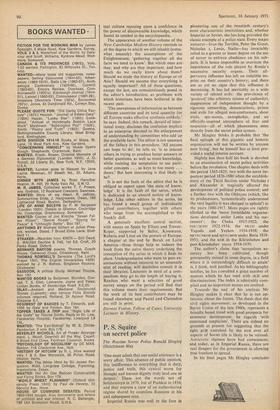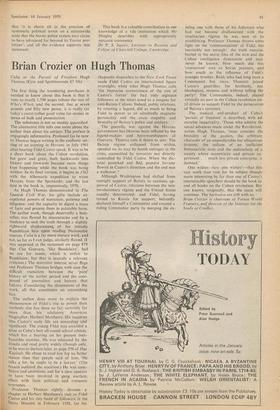P. S. Squire
on secret police
The Russian Secret Police Ronald Hingley (Hutchinson 60s) 'One must admit that our social existence is a sorry affair. This absence of public opinion, this indifference to everything that is duty, justice and truth, this cynical scorn for thought and human dignity truly lead one to despair.' These are the words not of Solzhenitsyn in 1970, but of Pushkin in 1836; and they express a view of an authoritarian regime shared by countless Russians in his and subsequent eras.
Imperial Russia was well to the fore in
pioneering one of the twentieth century's most characteristic institutions and, whether Imperial or Soviet, she has long provided the classic example of a police state. Every major autocrat—Ivan the Terrible, Peter the Great, Nicholas 1, Lenin, Stalin—has invariably relied to a greater or lesser degree on the use of terror to enforce obedience on his sub- jects. It is hence impossible to overstate the importance of the role played by Russia's successive security organs. Their all- 'pervasive influence has left an indelible im- print on their country's history; and there are as yet no signs that this influence is decreasing. It has led inevitably to a wide variety of related evils: the prevalence of 'proizvol' (the arbitrary misuse of authority), suppression of independent thought by a rigorous censorship, denunciations, prison and exile for alleged non-conformers, show trials, spy-mania, xenophobia, and an officially-inspired atmosphere of fear and suspicion—all of which phenomena stem directly from the secret police system.
Mr Hingley thinks it probable that 'the final epitaph of this gigantic and historic organisation will not be written by anyone now living', but he himself has at least pro- vided a useful interim account.
Slightly less than half his book is devoted to an examination of secret police activities before the revolution. One chapter deals with the period 1565-1825; two with the more im- portant period 1826-1880 when the establish- ment of the Third Section under Nicholas I and Alexander it tragically affected the development of political police control; and a further two with the Okhrana (which, like its predecessors, 'systematically undermined the very legality it was charged to uphold') in the years 1880-1917. More pages are rightly allotted to the 'more formidable organisa- tions developed under Lenin and his suc- cessors': the Cheka 1917-1922; the CPU /OGPU 1922-1934; the NKVD under Yagoda and Yezhov 1934-1938; the NKVD/NKGB and mvointon under Beria 1938- 1953; and the KGB in the Khrushohev and post-Khrushchev years 1954-1970.
The author's claim that 'scrupulous ac- curacy has been cultivated, though presumably missed in some degree, in a field where it is outstandingly difficult to attain' is, I think, well justified. As his bibliography testifies, he has consulted a great number of sources which he has used with skill and discrimination. The index is admirably com- piled and no important names are omitted.
Towards the end of his analysis Mr Hingley makes it clear that he is not op- timistic about the future. The thesis that the civil rights movement, as developed in the Soviet Union of the late 1960s, represents a broadly based trend with good prospects for extensive development, he regards 'with continued scepticism'. There are indeed no grounds at present for suggesting that the tight grip exercised by the KGB over all aspects of Soviet life is likely to be relaxed. Autocratic regimes have bad consciences; and today, as in Imperial Russia, there are real dangers for the government in allowing true freedom to spread.
In his final pages Mr Hingley concludes
that 'it is above all in the creation of systematic political terror on a nationwide scale that the Soviet police system may claim to have advanced far beyond its Tsarist pro- totype'; and all the evidence supports this statement. This book is a valuable contribution to our knowledge of a vile institution which Mr Hingley describes with appropriately sarcastic comments.
Dr P. S. Squire, Lecturer in Russian and Fellow of Churchill College, Cambridge.











































 Previous page
Previous page